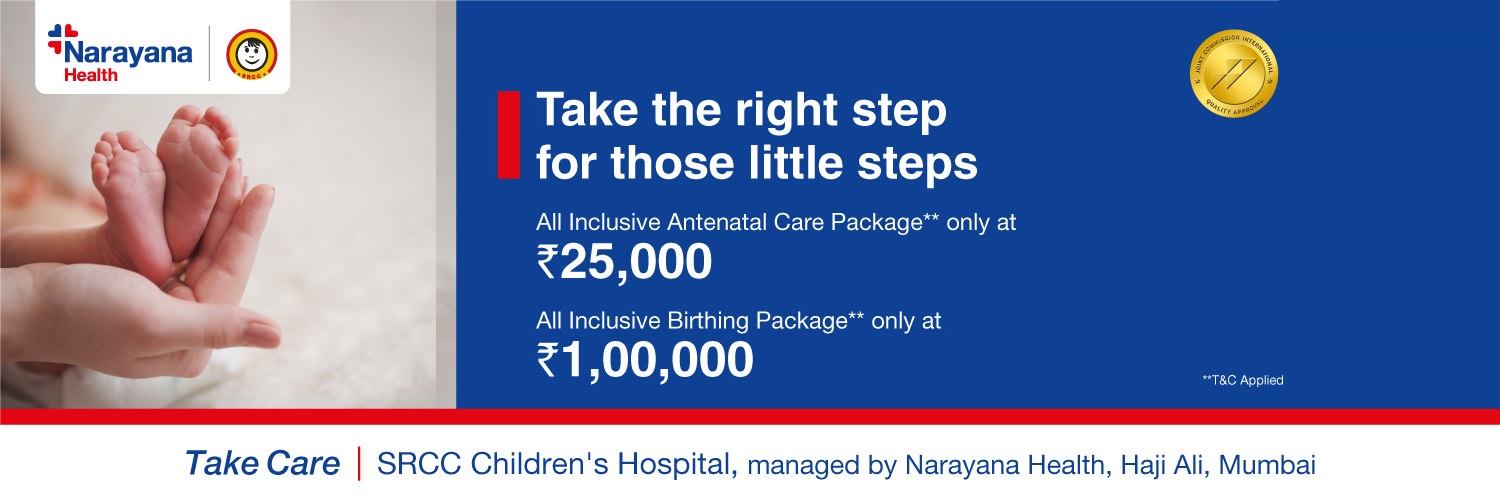Pregnancy to the following childbirth is the key milestone in any family. To turn this nine-month-long journey of motherhood into a happening and magical one, Narayana Health’s SRCC Children’s Hospital, at Haji Ali, Mumbai, introduces “First Breath – where parents are born.”
First Breath, a comprehensive birthing program supported by state-of-the-art technology, infrastructure, and world-class clinicians, not only offers medical care but also addresses wellness to well-being through the tailored-made programs like Yoga, Physiotherapy, Psychological assistance to Dietitian's advice for the mother to be.
First Breath provides personalized and the right care to each for smooth and hassle-free motherhood.
SRCC Children’s Hospital is a Multi-speciality Tertiary Care Hospital dedicated to treating infants, children, and young adults with all pediatric super specialties under one roof. We have a team of experienced and highly trained Paediatric Specialists comprising Obstetrician, Fetal Medicine Specialist, Neonatologist, Paediatric Surgeon, Paediatric Cardiologist, Paediatric Cardiac Surgeons, Paediatric Neurologist, Paediatric Neurosurgeon, Geneticist, etc. in the country, capable of managing complex medical/surgical conditions in the fetus during pregnancy and in new-born after delivery.
The services provided in this program are as follows:
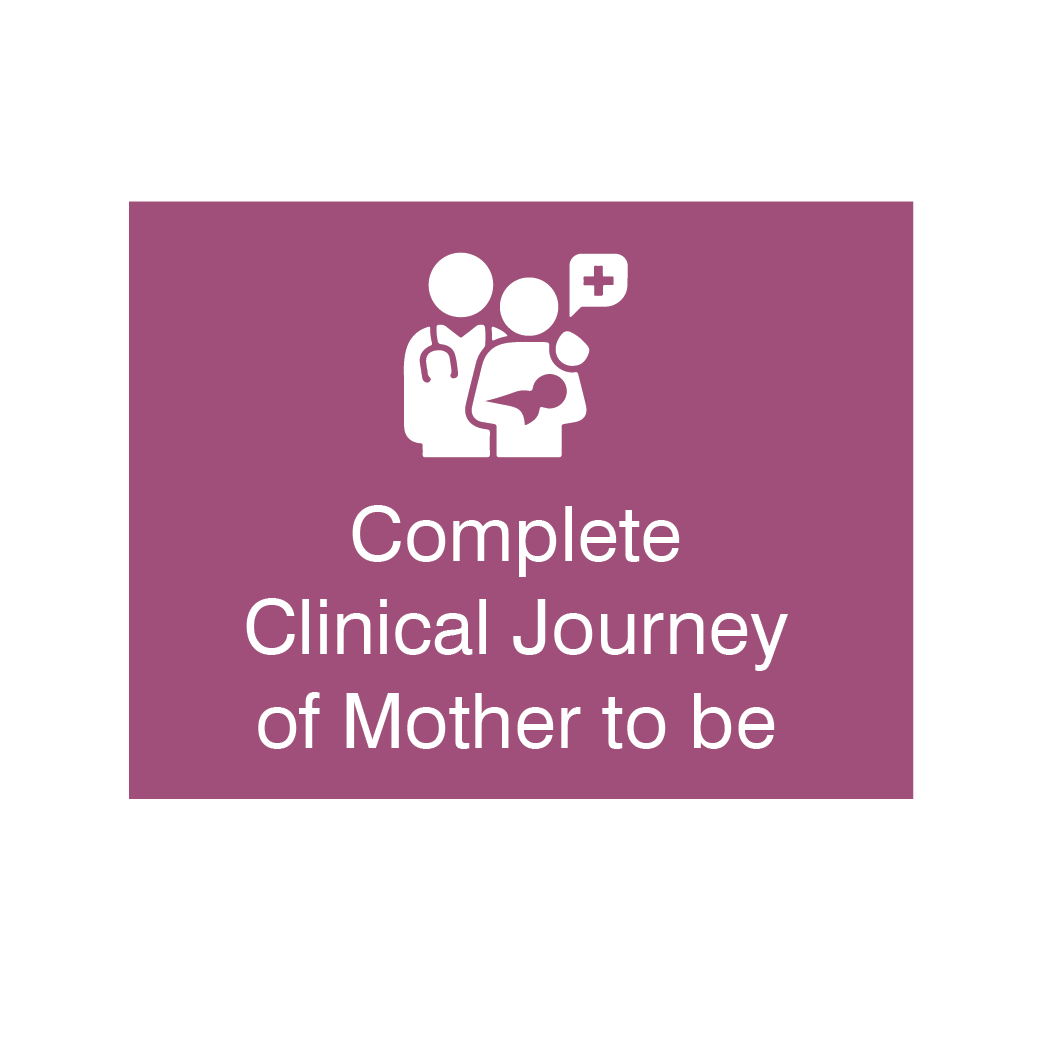
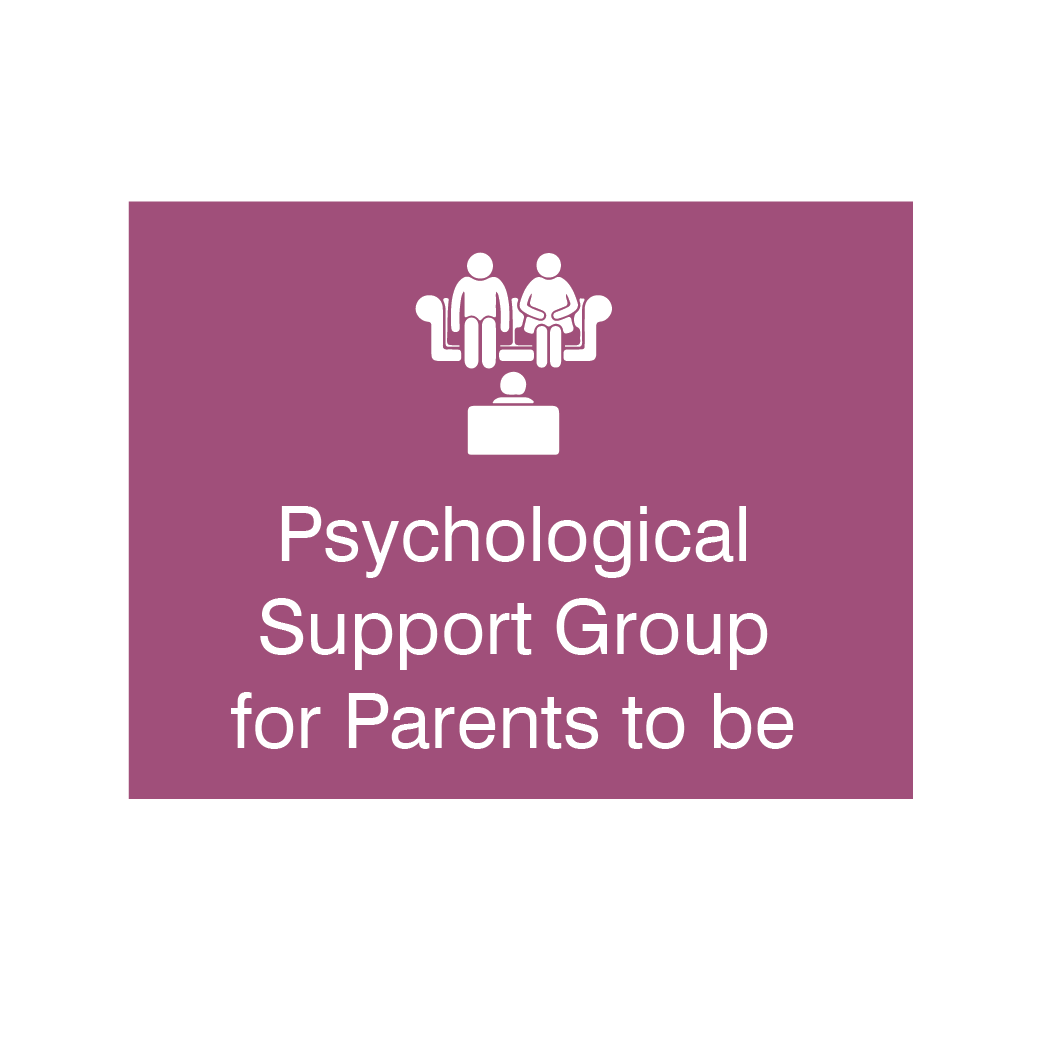
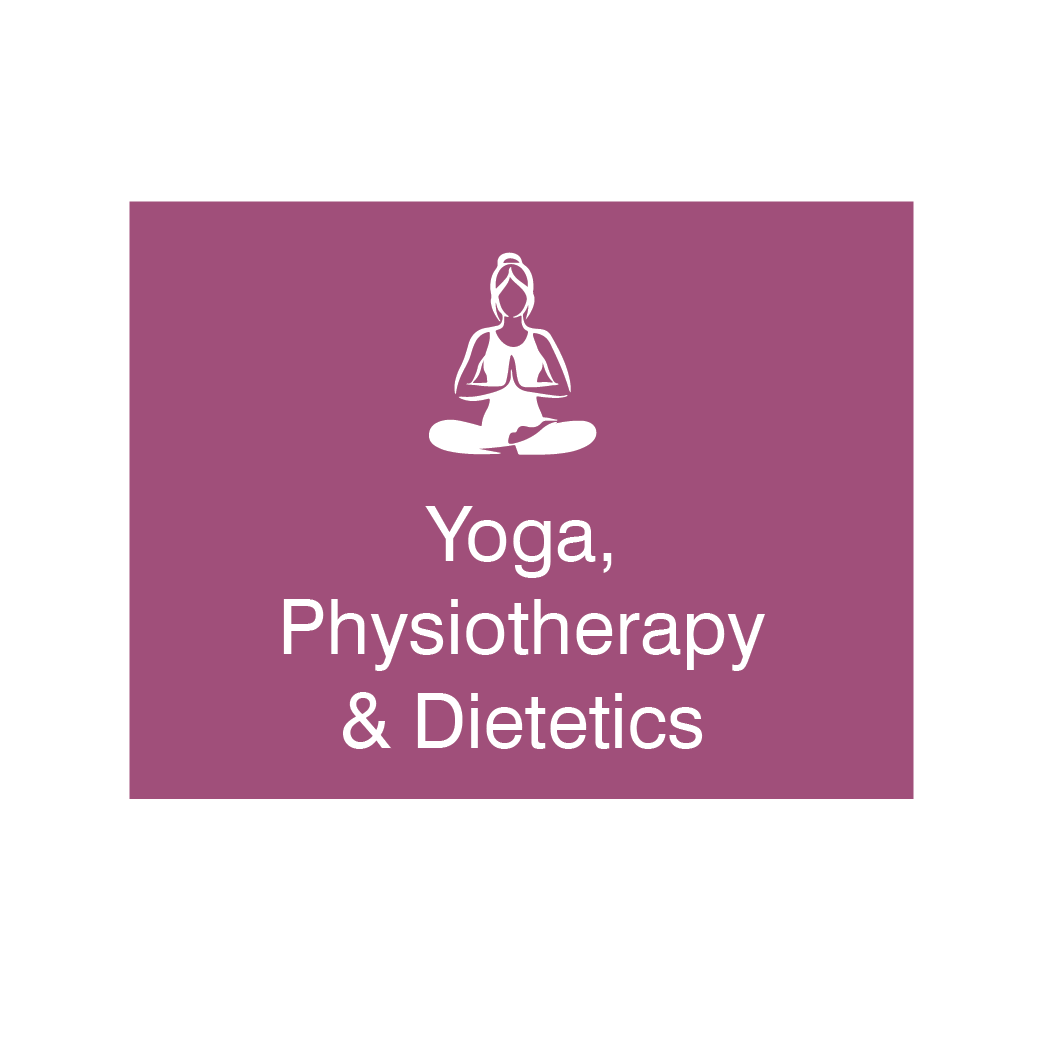
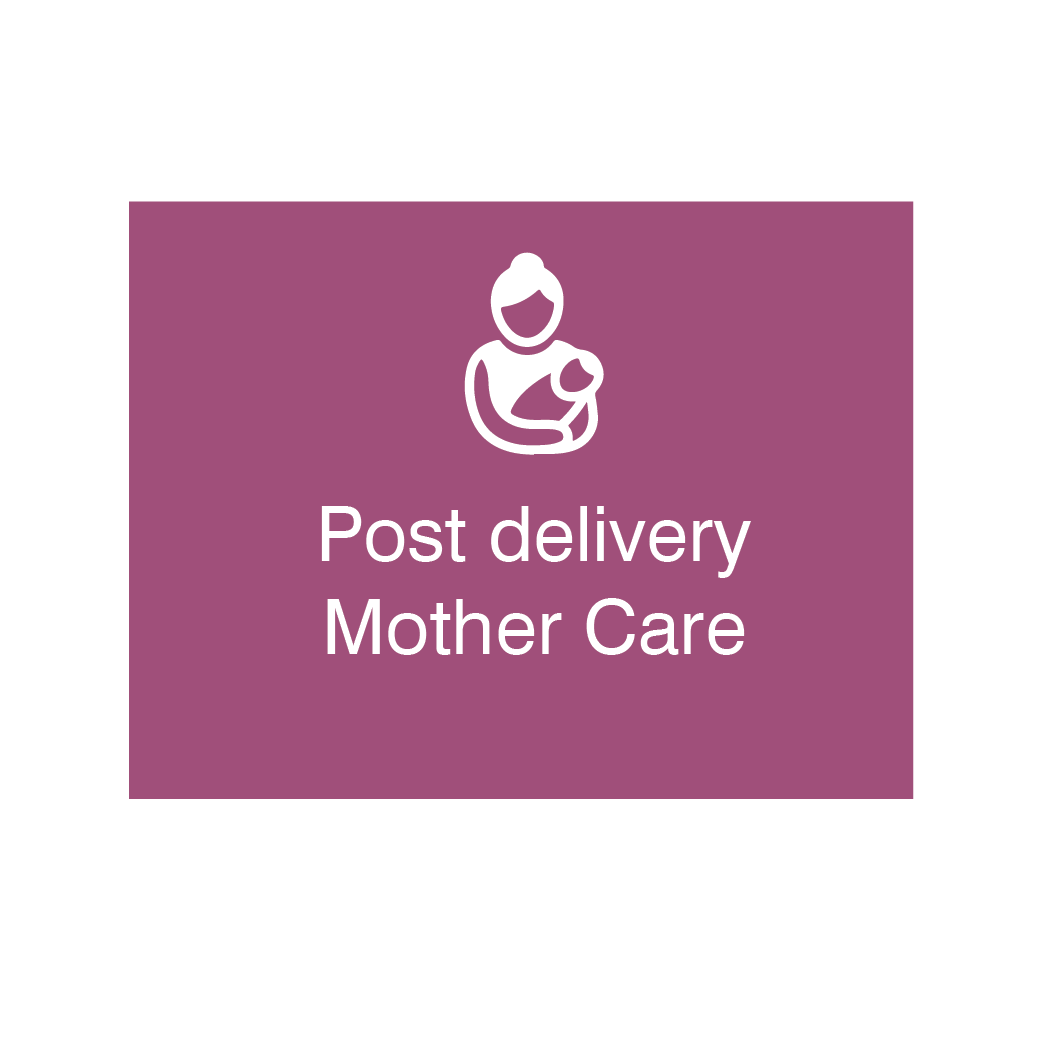
During pregnancy if there is no physical or mental discomfort one can continue with her professional life provided the work is not hazardous or mentally stressful. Once one decides to continue with her professional life during this tender phase, she needs to do it in concurrence with her treating doctor’s advice and following a few basic things that will not only keep her productive in her professional life, also keep her healthy as well.
Taking a short and regular breaks : Do not work for long at a stretch. Go for a short and frequent breaks. Stroll for a few minutes, and even spend a few minutes with eyes shut and feet up will reenergize you.
Drinking sufficient fluids : Drinking water throughout the day will keep you refresh by regulating your body temperature, lubricating your joint, delivering nutrition to cells and preventing infection.
Doing away with needless activities : Do not overwork, go for a daily to-do lists according to the priority and try to delegate work as much as possible. Exclude unnecessary works from your routine.
Talking your stress out : Never allow stress to build-up. Stress has the potential to have an undesirable effect on both you and the foetus inside. Ventilate your stress or frustration by sharing it with close colleague or supportive co-worker.
Keeping nausea at bay : Pregnancy queasiness or morning sickness can be triggered by some specific odors or smell or taste of certain foods, which vary person to person. Daylong feeling of nausea, which is common till 3rd or 4th month of pregnancy, can disturb your work-life. So, to stay away from nausea follow the steps like choosing food carefully, snacking often, drinking water a plenty, etc.
Hitting bed early: Set a self-goal for at least eight hours of sleep each night. To ensure this hit bed early, stop using cellphone, at least 30 minutes before.
Following a fitness routine : Physical activity can help lift energy levels — especially for those who are mostly sedentary. Moving around every few hours also can ease muscle tension and help prevent fluid buildup in the legs and feet. According to the advice of your obstetrician take brief walk or join any prenatal fitness class.
With the progress of one’s pregnancy, everyday activities like sleeping, sitting and standing often turn uneasy. Select a comfortable chair with good lower back support can make long hours of sitting much easier. Go for a small pillow or cushion to provide extra support for the back. Try to keep the feet in the same level to avoid swelling.
Knowing how to stand and bend: Those who have to stand for long periods ensure to put one foot up on a footrest, low stool. Switch feet often and take frequent breaks. Be careful when you need to lift something , be careful about the weight. Even when lifting something light, try to bend at the knees, not at the waist. Avoid twisting the body while lifting.
• Antenatal check-up
- Consultation & Examination (monthly or earlier if needed)
• Ultrasound - Early Pregnancy
• Antenatal Blood Profile (11 weeks)
• FTS - First Trimester Screening (11 to 13 weeks)
- Nuchal Translucency / Nasal Bone Scan 1 + Dual Marker Test
• Antenatal check-up
- Consultation & Examination (monthly or earlier if needed)
• Quadruple Marker (if advised by Obstetrician)
• Ultrasound
- Anomaly / Malformation Scan (18 to 20 weeks)
- Cardiac Facial Scan (24 to 26 weeks)
• Gestational Diabetes & Anaemia (24 to 26 weeks)
• Antenatal check-up
- Consultation & Examination (monthly or earlier if needed)
• Gestational Diabetes & Anaemia
• Ultrasound
- Growth Doppler (4 to 6 weekly)
Conceive
• First Breath Clinic
• Gynaecology Consultation & Examination
• CBC
• Blood Sugars
• Thyroid Profile
• Blood Group
• Sexually transmitted infections
• Pap Test
(Mother)
• Post-natal check-up
- Consultation & Examination (Immediate post-delivery or monthly if needed)
• Lactational Counselling
• Counselling regarding Perineal Hygiene
• Postnatal Exercises
• Nutritional Counselling
• Psychotherapy (if needed)
Features
• Yoga class for mother
• Psychological support group for both mother & father
• Bloom - taking care of your baby from infancy to adolescence
Pregnancy doesn’t end with giving birth, nor giving birth ends with a vaccination program. Here at SRCC Children’s Hospital, managed by Narayana Health Mumbai; experience and enjoy the journey from ‘good news’ to your child attaining adulthood.
Introducing “Bloom – from infancy to adolescence”
A comprehensive health & wellbeing program, specifically curated for children from birth till they attain 18 years of age.
SRCC Children’s Hospital is the premier medical institution for children in Mumbai, backed by Narayana Health, the hospital combines advanced paediatric medical experience with world-class facilities to ensure quality medical care for infants, children and adolescents.
With years of experience and learning, our team of medical and non-medical paediatric specialists have built this program Bloom, that addresses the physical and mental health needs of children in a phase-wise manner when they grow up from infant to an adult. Your child’s health and wellbeing will always remain our priority from infancy to adolescence!
The services provided in this program are as follows. The timelines of each service will be provided by your Doctor:
After 5 years, every year Dental and Eye Check will be complimentary.
-
- 5% on IP and day care procedures (excluding drugs, consumables & implants)
- 10% on all OPD Pharmacy
- 10% on all OPD Consultation
- 15% on all OPD (in-house) investigations & diagnostics

81 Critical
Care Beds

3 Tesla
MRI

7 Operation
Theatres

128 Slice
CT Scan

Transfusion
Medicine

Nutrition
counselling

Advance Laparoscopic
Surgical Equipment

Day Care
Ward
